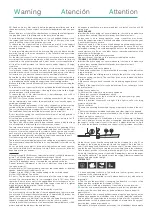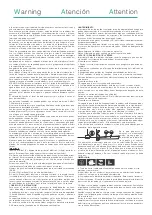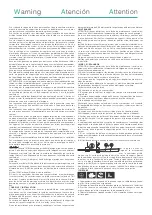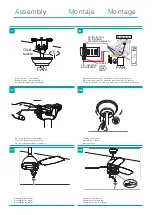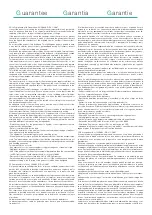
EN
Read entire booklet carefully before beginning installation and save
these instructions. Please contact our technical department with any que-
ries.
Always take into account all the specifications of the appliance that figure on
the grey label stuck to the lamp and on the installation diagram.
To avoid damage to finish, assemble motor on soft padded surface or use
the original foam inset in motor box. Do not lay fan on its side as this could
result in shifting of motor in decorative enclosure.
To reduce the risk of personal injury, attach the fan directly to the support
structure of the building according to these instructions, and use only the
hardware supplied.
To avoid possible electrical shock, before installing your fan, disconnect the
power by turning off the circuit breakers to the outlet box and associated
wall switch location.
For the electrical connection it is necessary to incorporate an isolator switch
according to the installation regulations, which ensures all-pole cut, directly
connected to the power terminals and it must have a contact separation in
all its poles, which provides total disconnection under category III surge
conditions.
All wiring and connections must be made in accordance with national and
local electrical codes.The ceiling fan must be earthed in order to prevent
possible electric shock. If you are not familiar with the way to do the electri-
cal installation, you must use the services of a qualified electrician.
Ensure that you don´t drill through electrical wires or any other obstruction in
the wall or ceiling during installation. Electrical wiring may never be clamped
or twisted between the ceiling fan support and the mounting surface.
Make sure that the fan is disconnected from the mains before removing the
protection.
To reduce the risk of personal injury, do not bend the blade attachment the
system when installing, balancing or cleaning the fan. Never insert foreign
objects between rotating fan blades.
To reduce the risk of fire, electrical shock or motor damage, do not lift or
carry the fan by the lead wires.
ATTENTION: If you notice an unusual oscillating movement of the fan, stop
the fan immediately and contact the manufacturer, your service agent or
suitably qualified persons.
The assembly and replacement of the safety suspension system must be
carried out by the manufacturer, its agent or suitably qualified persons.
The roof fixing system must support at least 4 times the weight of the fan.
The fan blades cannot be installed lower than 2,3m from the floor.
Do not install the ceiling fan on surfaces that are moist, dreshly painted or
electrically conductive.
All ceiling fans without special protection against dust or moisture (no IP
rating) may be used indoors, except in bathrooms.
The lights with LED modules should be positioned in such a way that they
are not exposed to direct sunlight or other sources of heat.
The important precautions, safeguards and instructions appearing in this
manual are not meant to cover all possible conditions and situations that
may occur. It must be understood that common sense, caution and careful-
ness are factors which cannot be built into this product. These factors must
be supplied by the person(s) installing, caring for and operating the unit.
Our fans comply with current safety regulations.
The internal or external manipulation of the ceiling fan may reduce its safety.
The manufacture cannot be held liable for any manipulation carried out by
the user.
As our products are subject to technical modifications, we cannot guaran-
tee, that all information is always up to date. Please contact our technical
department with any queries.
I
mportant
Nominal voltage (V) Difference of electrical potential (voltage) between two
points. This voltage must not exceed that marked on the fan.
Nominal frequency (Hz) Measures the number of repetitions per unit of time
(Hertz). This frequency must not exceed the one marked on the fan.
Current intensity (A-Ampere) is the flow of electrical charge that travels
through a material.
Nominal power (W) the maximum power that the fan demands at different
speeds, under normal conditions of use.
Number of turns (RPM) Of the fan depending on the selected speed.
Air flow (CFM/m3min) Fan air flow
DC motor: The fan operates with direct current at the same voltage (direct
current). It is characterized by: Its low consumption (up to 70% less); Silent
operation; An accurate control of the speed; Speed for starting actions, ac-
celeration, deceleration and stoppage; Wide range of speeds; it is lighter
which facilitates the installation; it does not heat up.
I
NSTALLATION
A
DVICE
To get the most out of it and ensure the durability of your fan.
You must correctly choose the size of the fan depending on the room where
you will install it. Respect the safety distance (2.3meters-90.50 inches) be-
tween the fan and surfaces, objects or people nearby
The surface where you will install the fan and the fixing bracket must be
capable of supporting 4 times the weight of the fan (kilos - pounds).
In installations with more than one fan, ensure the minimum distance of 2.30
meters between the blades of the different fans.
As experts in ventilation, we recommend that you install your fan at 2.30
meters high.
M
AINTENANCE
Important! Before carrying out any maintenance / revision task, make sure
you have disconnected the electrical power from the main circuit.
As fans tend to move during operation, some connections may loosen.
Check the supporting screws, brackets and blade attachments twice a year
to ensure that they are secure.
There is no need to oil the motor as the bearings are permanently lubricat.
Cleaning the fan helps to maintain its appearance for years. Do not use
water when cleaning. This could damage the motor or the blades and could
cause electrocution. Do not use dissolvents or abrasive substances. Use
normal neutral PH detergent.
Never clean the fan with pressure systems.
Use a soft brush or lint-free cloth to prevent scratching the surface.
T
ROUBLE-
S
HOOTING
G
UIDE
Important! Before carrying out any maintenance / revision task, make sure
you have disconnected the electrical power from the main circuit.
Ceiling fan do not start
1. Check the fuses and circuit breakers.
2. Review the connections of the terminal block according to the indications
in the installation.
3. Make sure that the sliding switch is firmly in the position of up or down
(when the ceiling fan has it). The ventilator does not work when the button
is in the middle.
4. Make sure that you have removed the stabilizing tongue-pieces of the
motor.
5. Finally if the fan will not start call an electrician. Do not attempt to touch
the internal parts.
Ceiling fan sounds noisy
1. Check that the screws are are properly tightened.
2. Check that canopy in assembled correctly.
3. llow at least 24 hours for the fan to settle, as many noise will go away.
Optional light kit doens’t work.
Check the terminal connections are tight. If the light is still not working
contact an electrician.
The fan oscillates
1. Ensure the mounting bracket and canopy are properly screws to the ceil-
ing.
2. Verify that the space between the blades and other objects is adequate.
3. Check the blades are securely fastened to the holders and the blade
holders are tight on the motor.
4. Verify that the height of all the blades to the roof is the same. If it detects
that one is different, place a washer, not supplied, between the blade and
the support, on the screw closest to the motor, to adjust this distance. fig. 6
5. In case the incidence continues, use the anti-roll kit provided, as follows:
On the shovel you notice the swing, with the fan stopped, fix a clip (1) on
the edge of the blade, between the tip and the support. Start the fan, to
see if it has been fixed. Otherwise, move the clip (1) towards the motor or
towards the end. Test until you find the position where there is least balance.
Once the best position is located, place the weight (2) on the line marked
by the clip towards the centre of the blade. Remember to remove the paper
covering the adhesive. This should correct the rolling. Otherwise, repeat the
process and add another weigh.
S
YMBOLOGY
RF
1- It has an earthing connection. The earth wire (yellow / green) has to be
connected to the clip marked with.
2- It should only be installed in rooms where direct contact with water is
impossible.
3- The fan has the possibility of changing the direction of rotation of the
blades and thus optimize the movement of the air.
4- Remote control with radio frequency. It emits waves to the receiver.
ES
Lea todo este manual antes de empezar la instalación y guarde estas
instrucciones. En caso de dudas, no dude en llamar a nuestro departa-
mento técnico.
Tenga en cuenta todas las especificaciones del aparato que figuran en las
etiquetas gris pegada en el ventilador y en la hoja del dibujo de instalación.
Para no dañar las superficies de la carcasa, monte el motor sobre una su-
perficie blanda o utilice la espuma suministrada en el embalaje. No apoye el
motor de lado, ya que podría dañarlo.
Para reducir el riesgo de lesiones personales, fije el ventilador directamente
W
arning
A
tención
A
ttention





